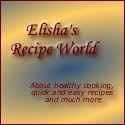Vegetarian Cooking - Which Foods To Choose To Ensure A Healthy And Balanced Vegetarian Diet
No matter which dietary style you follow, it’s always important to stick to certain rules to get its maximum health benefits. The most crucial thing is to keep your diet balanced to ensure that your body really gets all nutrients it needs, but without eating excess calories or unhealthy food additives.
Vegetarian cooking is no exception of this rule. It’s in general a very healthy way of eating, and vegetarians rarely suffer from overweight, but still there are “fat traps” even in the vegetarian diet, and you need to choose your foods wisely to prevent a lack of the nutrients you would normally get from your meat.
Read on about the importance of the different nutrients for your body and the most important sources for these in vegetarian cooking:
They keep your body healthy and functioning the way it should. These are the nutrients you need to worry about the least when you are a vegetarian. In fact, with a balanced vegetarian diet it’s very difficult to suffer from a lack of any vitamin.
Fruit, vegetables and legumes contain plenty of vitamins and minerals. Another important source is eggs and dairy products. These contain especially high amounts of vitamin B12 and iron which are the nutrients that vegetarians have the highest risk of developing a lack of.
To make sure you get sufficient amounts of the various vitamins and minerals, include a wide variety of fruits, vegetables and legumes in your diet over the course of the week, combined with dairies and eggs. Preferably buy fruits and vegetables fresh as these contain most nutrients, and avoid storing them long.
2. Fiber
This is important for stimulating your digestive system. A balanced vegetarian diet will certainly provide you with sufficient fiber since fruit, vegetables and starchy foods contain a high amount of fiber.
Unrefined or little refined products (e.g. whole grain products, brown rice) contain more fiber than the refined ones like white bread or rice.
High fiber foods are:
- beans and peas (fresh or dried)
- cabbage
- un-pealed potatoes
- carrots
- corn
- spinach
- dried and fresh fruit (always eat the whole fruit!)
- whole grains and whole grain products
3. Carbohydrates
That’s one of our energy providers found mainly in starchy foods but also in some fruit or vegetables. Prefer foods containing many complex carbohydrates to those with mainly simple ones. The glucose in complex carb foods is released into the blood stream much slower, thus giving you energy for longer.
Foods high in complex carbohydrates are:
- whole grain products (e.g. whole grain bread, whole grain pasta)
- grains (wheat, barley, buckwheat, rye)
- potatoes
- rice
- corn
- dried beans
- lentils
- bananas
4. Proteins
Proteins are important for cell growth and regeneration and the immune system. Yet we only need a relatively small amount of them. It’s important to consume foods that contain the so-called essential amino acids (protein components) which our body cannot produce itself.
Protein rich foods are:
- dairy products (milk, cheese, yoghurt)
- eggs
- nuts and seeds
- legumes (fresh or dried peas, beans and lentils, peanuts, soybeans)
- grains and grain products
- grains and legumes: baked bean chili (a vegetarian version of chili con carne) with whole grain rolls, whole grain sandwich with peanut butter, rice with lentils grains and dairy: muesli with milk, pasta with cheese
- legumes and dairy: an oven-baked dish of beans, chickpeas and other vegetables, covered with a moderate amount of cheese
- eggs and grains: pasta with baked eggs
- grains and nuts: muesli with nuts
5. Fat
Fat is our body’s second energy provider. Vegetarians usually consume less fat and healthier fats than meat eaters since vegetables mainly contain unsaturated fats, but even in vegetarian cooking you still need to pay attention to “fat traps”:
- avoid adding too much fat to your food, no matter which kind of fat
- avoid frying foods
- keep animal fats like butter to a minimum
- use coconut oil, milk and cream rather sparingly since they contain saturated fats
- keep dairy products (milk, cheese, yoghurt, cream, sour cream) in moderation or choose fat-reduced versions
- vegetable oils (especially olive oil) and products made from these
- nuts and seeds
- grains and grain products
- avocadoes
- Healthy Eating For Kids - 5 Tricks How To Make Your Children Eat Healthy Food
- Salad Fixing Ideas to Liven Up Your Meal
- Salads - Boosters For Your Health
- The Cholesterol Threat - Why Your Cholesterol Level Is High And How You Can Effectively Fight It
- The Thing With Fat - Healthy And Unhealthy Fats
- Vegetarian Cooking For Kids - How To Ensure Your Vegetarian Child Gets All The Nutrients She Needs
- Vegetarian Cooking - How The Cherished Diet Without Meat Can Make You Healthy




